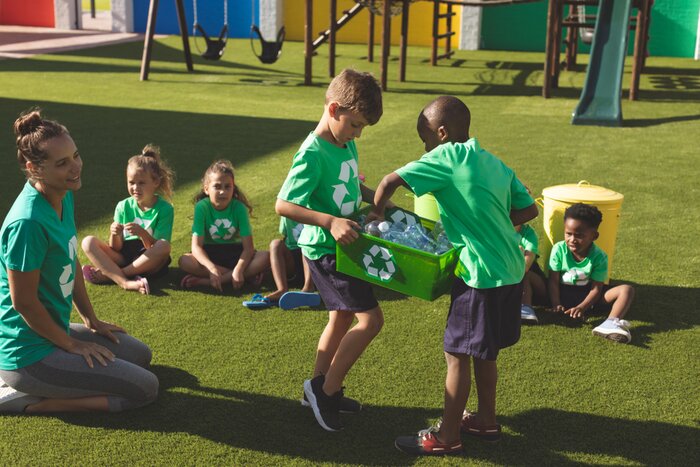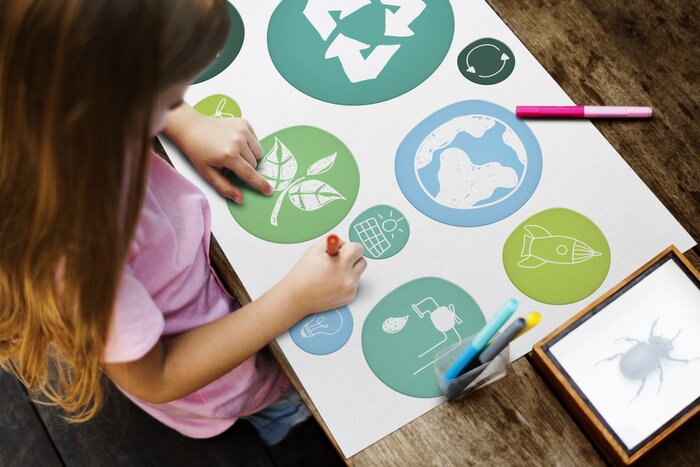
Articles
We aim to give food for thought as well as inspiring your creativity and
providing practical ideas you can’t wait to implement in your own settings!
Educating for a Sustainable Future:
Schools’ Journey to Net Zero

Collective Action: The Power of Small Changes
In the realm of education, the role of schools extends far beyond mere academic instruction; it encompasses shaping future citizens equipped with the consciousness and capabilities to address the environmental crises facing our planet. As educators, we are uniquely positioned to influence the next generation, instilling in them the principles of environmental stewardship and the importance of living in harmony with our planet. Having led primary schools for over sixteen years, I have come to understand the profound impact that schools can have not only on the academic development of children but also on their environmental consciousness. This journey towards sustainability is aptly encapsulated by the ancient wisdom of Confucius: "If your plan is for one year plant rice. If your plan is for ten years plant trees. If your plan is for one hundred years educate children.” This quote underscores the essence of our mission: to cultivate a mindset that values and works towards the sustainability of our planet for generations to come. We must lead by example, showing the children we work with ‘the way’, and educating them in the importance of the decisions we all make on a daily basis.
The Role of Responsible Purchasing in Achieving Sustainability
At the forefront of our quest for sustainability is the concept of responsible purchasing. This approach advocates for making conscious decisions in procurement, prioritising products and services that have the least environmental impact. While this might lead to higher initial costs, the focus shifts from short-term savings to long-term environmental benefits. For example, choosing recycled paper over non-recycled alternatives, despite the probable price difference, exemplifies this shift. By adopting practices that reduce overall consumption—such as digital recording over paper-based assignments, not sticking paper into paper exercise books, using both sides, or reducing the size from A4 to A5—we can mitigate these costs. It is not just about reducing expenses; it is about making choices that foster a positive impact on the environment.
Collective Action: The Power of Small Changes
The journey to sustainability in schools is not one to be undertaken in isolation. It requires the collective effort of the entire school community. Each small change, when multiplied across numerous individuals and numerous schools, can lead to substantial environmental benefits. If every school committed to just one improved sustainable practice, be it reducing energy consumption, minimising waste, or embracing plant-based meal options, the cumulative effect could significantly alter the trajectory of our environmental impact.

Identifying and Addressing Carbon Culprits
A critical step in our sustainability journey is recognising and mitigating the primary sources of carbon emissions in our schools:
- Excessive Energy Consumption: Implement energy-saving measures, such as LED lighting and energy-efficient appliances, turn down the heating and have it on for less time, and foster a culture of conservation.
- Waste Generation: Promote a paper-’less’ (less use, rather than entirely eliminate use) environment where feasible and encourage comprehensive recycling programs.
- Unsustainable Transport: Advocate for walking, cycling, public transport, and carpooling among the school community - with staff leading by example.
- Resource Overuse: Introduce water-saving devices and practices to minimise water wastage.
- Unsustainable Food Choices: Offer plant-based and locally sourced food options to reduce the carbon footprint associated with food production and transport.
- Inadequate Insulation: Invest in improving the school’s insulation to reduce the need for heating and cooling.
- Single-Use Plastics: Replace single-use plastics with sustainable alternatives.
- Inefficient Heating and Cooling Systems: When it is time to replace, upgrade to more energy-efficient systems and ensure they are properly maintained.
- Lack of Awareness: Incorporate environmental education into the curriculum to raise awareness among students and staff.
- Reliance on Non-renewable Energy: Explore renewable energy options like solar panels to decrease dependence on fossil fuels. A simple switch to a green energy provider would have an instant impact.

Identifying and Addressing Carbon Culprits
Adopting sustainable practices and responsible purchasing does not necessarily equate to increased overall expenses. By focusing on quality over quantity and investing in durable, long-lasting products, schools can balance the higher costs of eco-friendly products with savings from reduced consumption. This approach emphasises the value of sustainability and responsible consumption, providing a valuable lesson to students on the importance of making environmentally conscious choices.
Conclusion
Our path towards sustainability is paved with the collective actions of schools and educators committed to making a difference. Guided by the timeless wisdom of Confucius, we understand that the greatest impact we can have on our planet's future is through education. By prioritising responsible purchasing, advocating for small yet significant changes, and embedding sustainability into our teaching and operational practices, we can inspire a generation that values and actively contributes to a sustainable future. As we embark on this journey together, let us remember that every action, no matter how small, is a step towards achieving a greener, more sustainable world for generations to come.
With many thanks to Paul Jackson for this thought-provoking article.
Paul is a consultant headteacher and member of our Teacher Board.